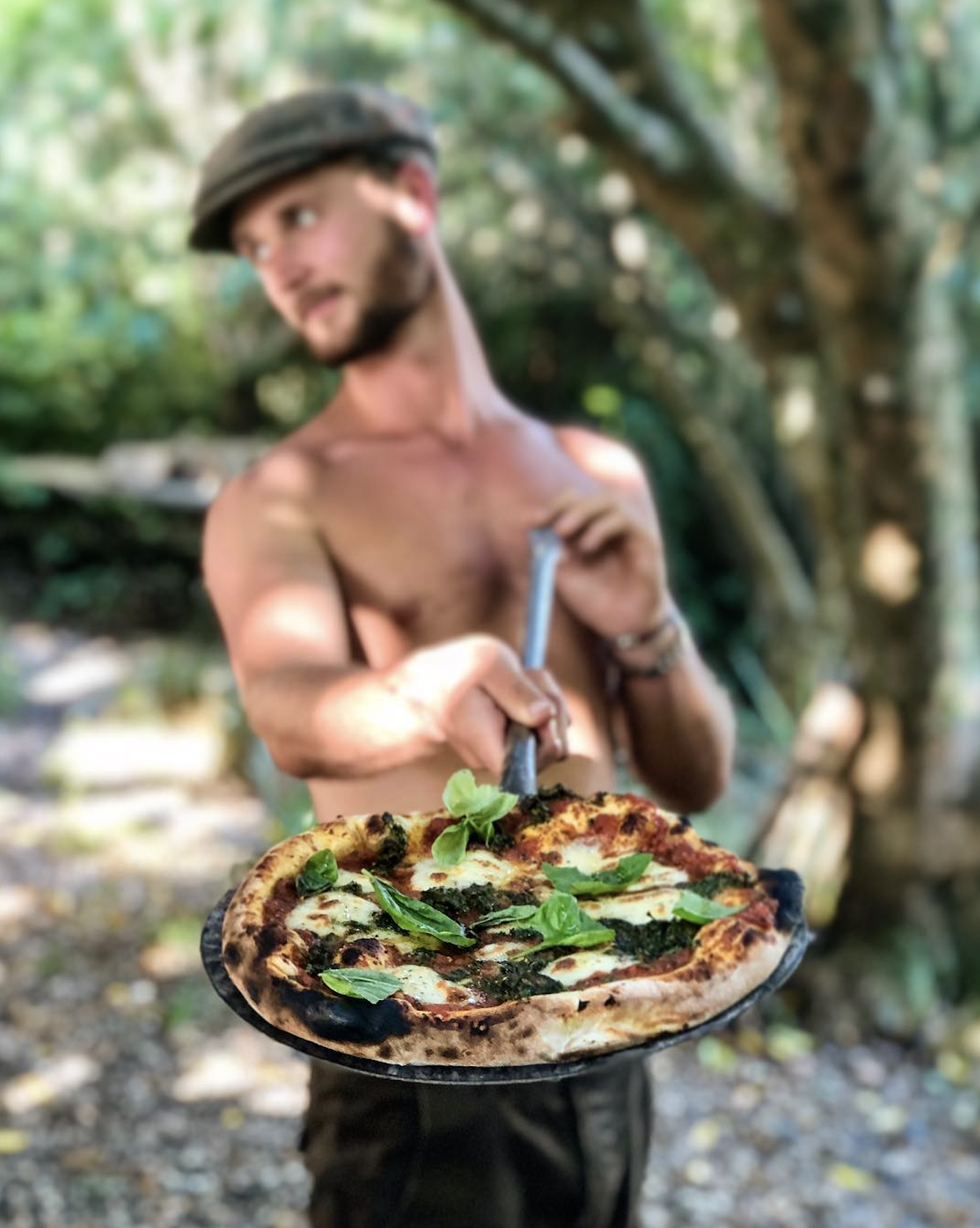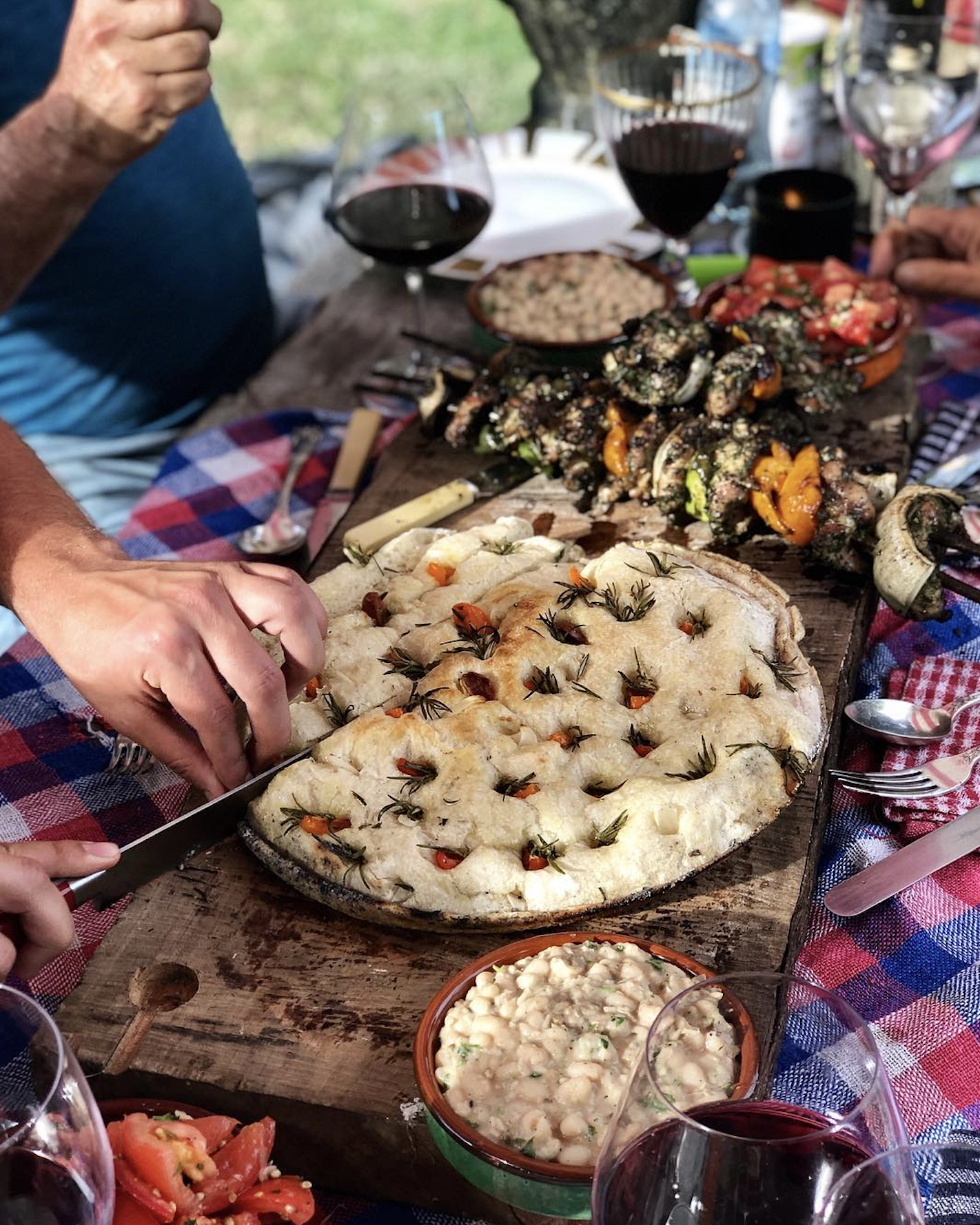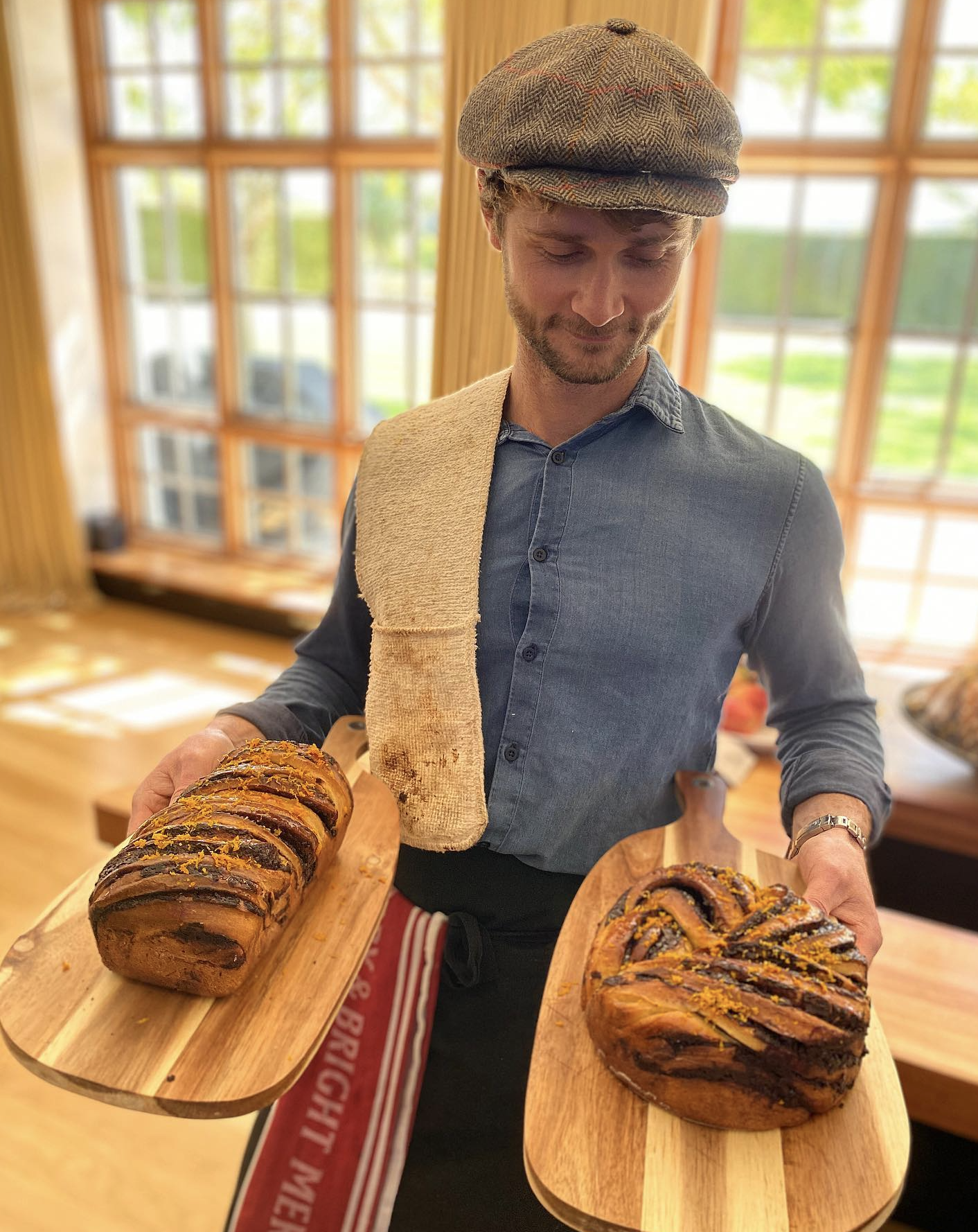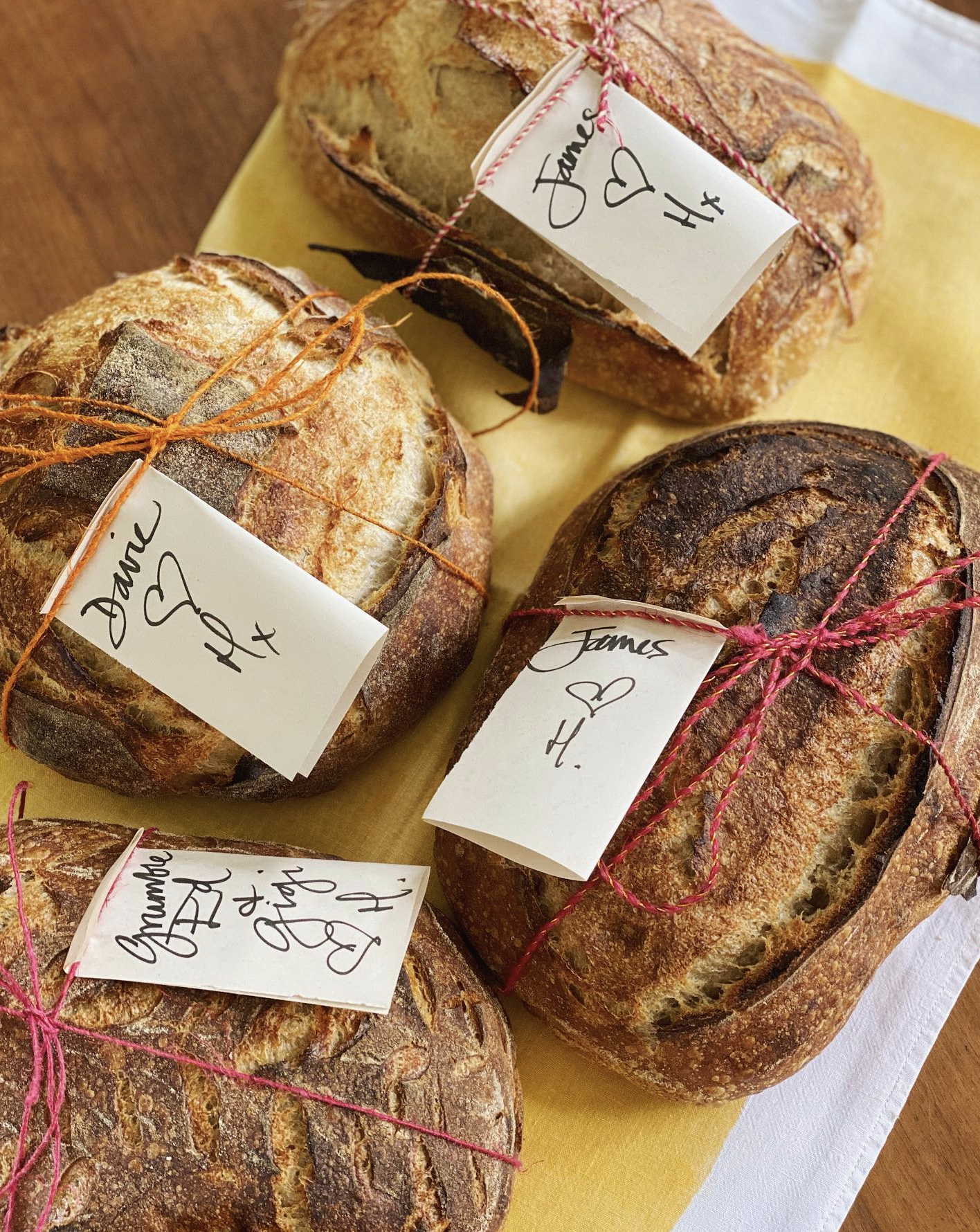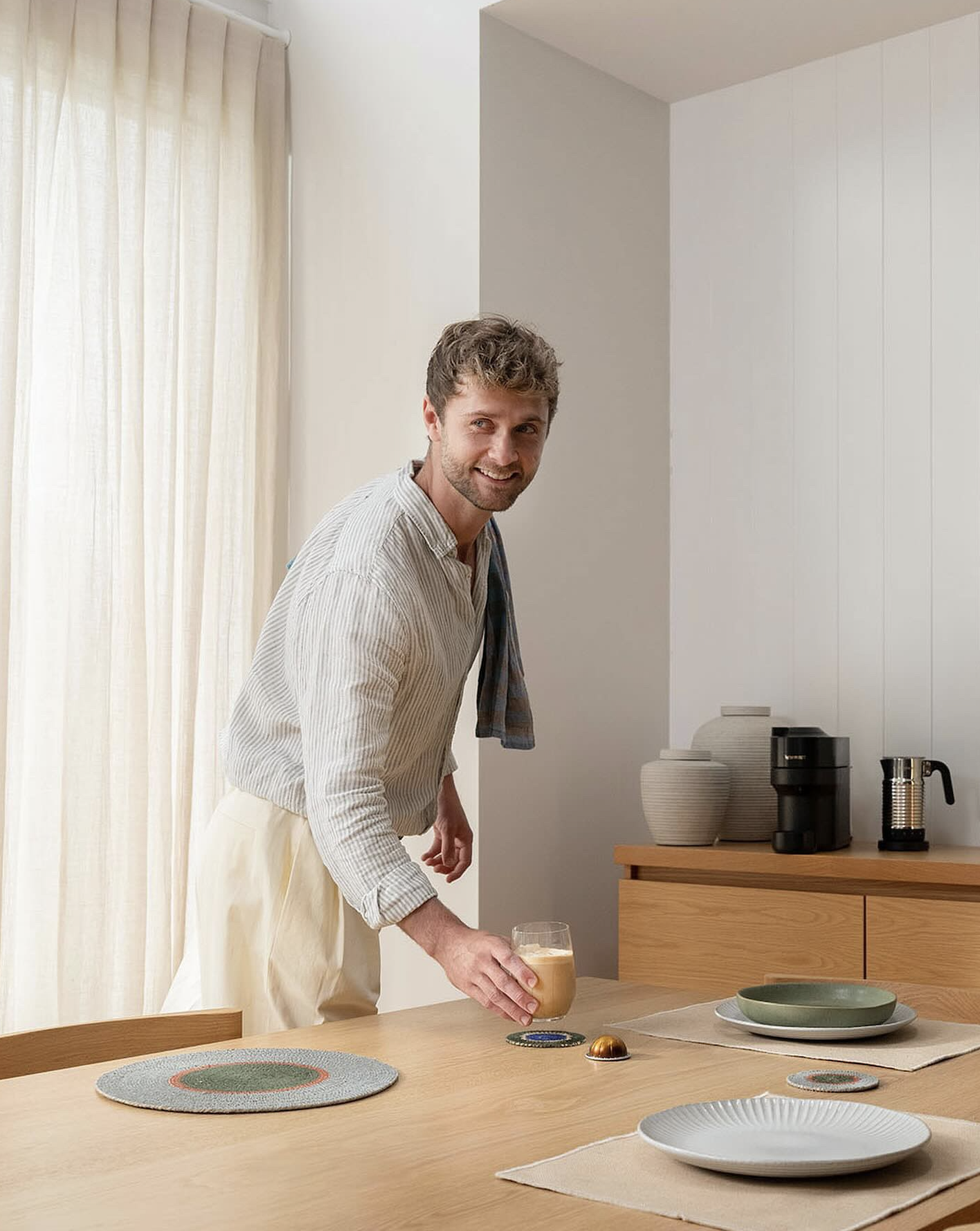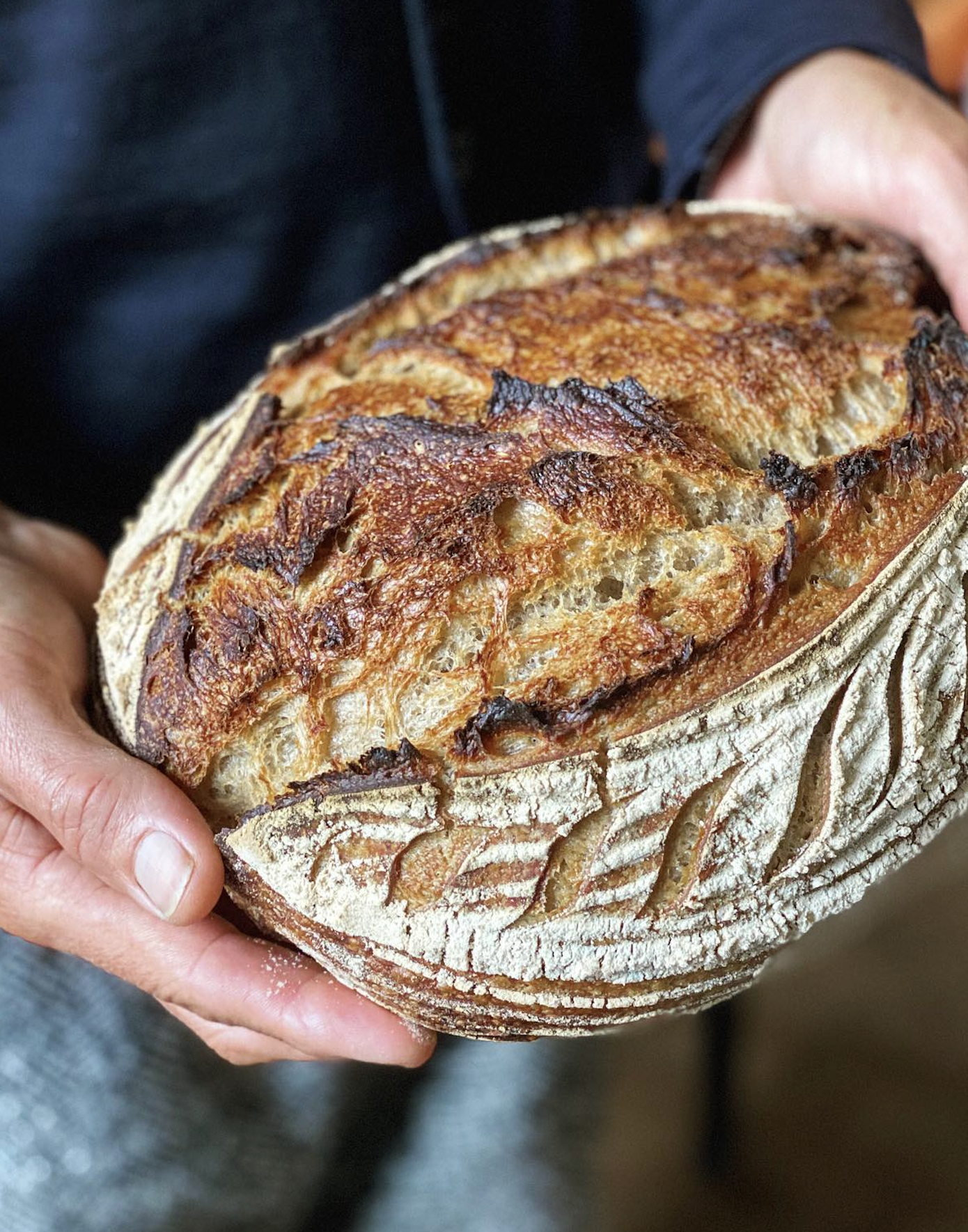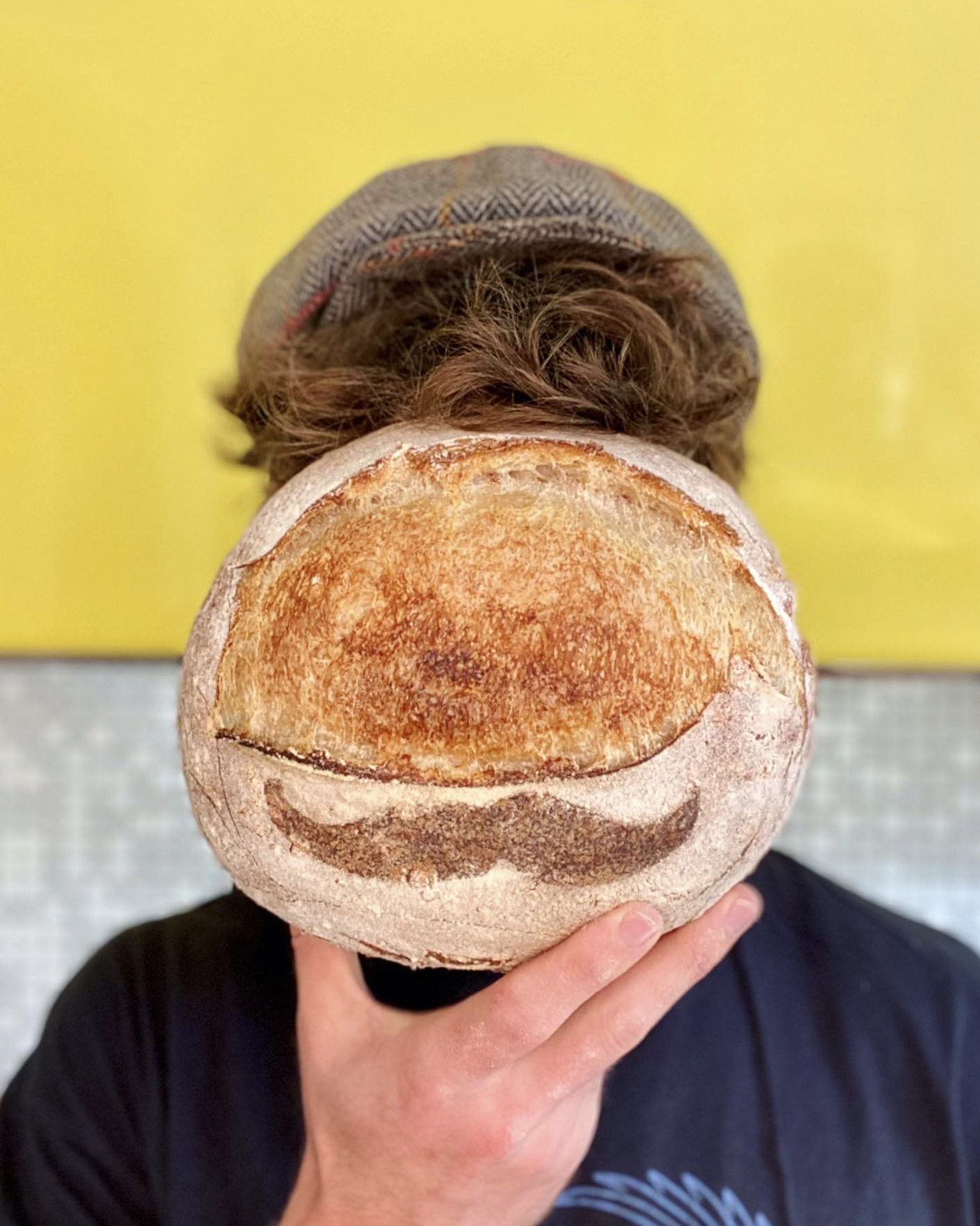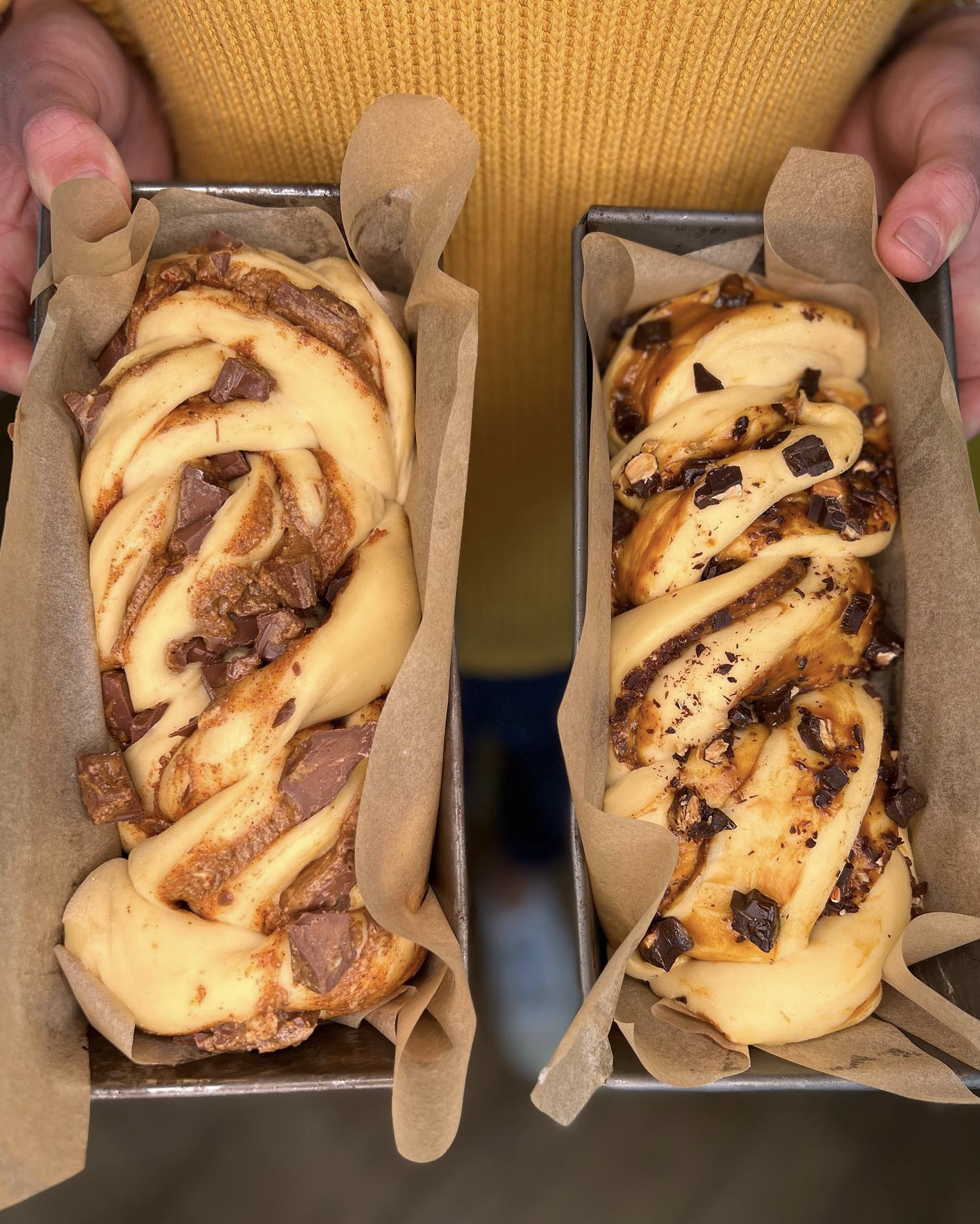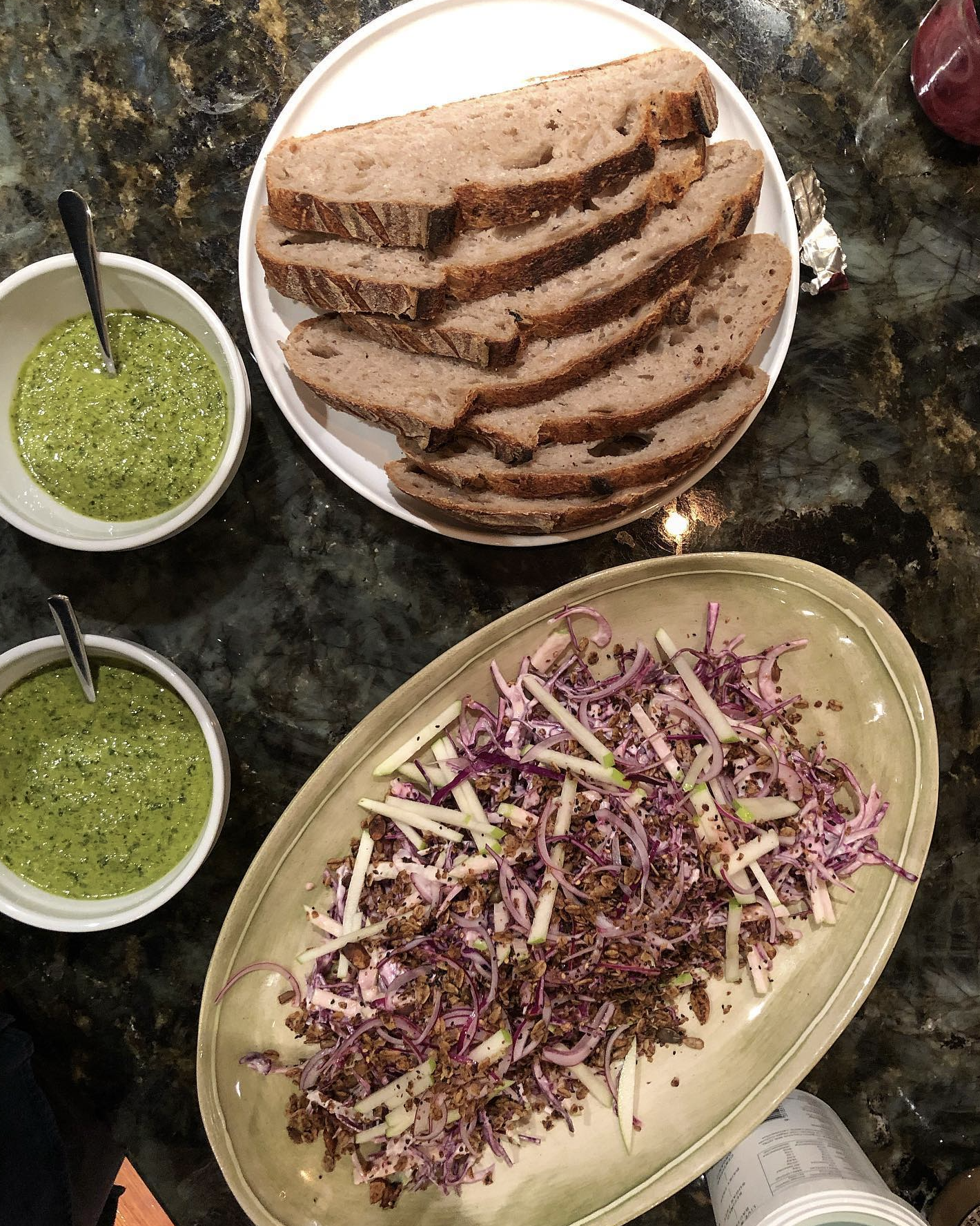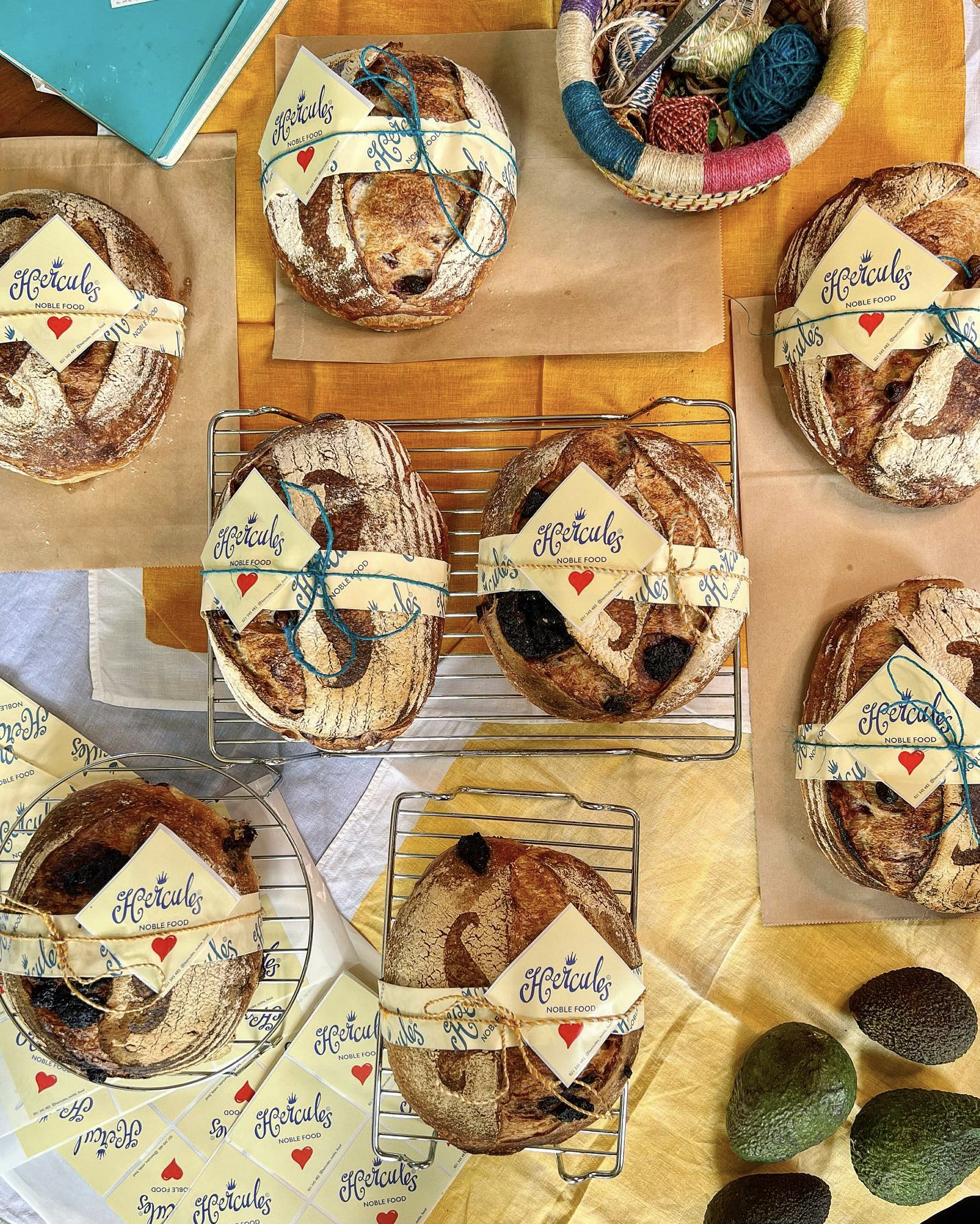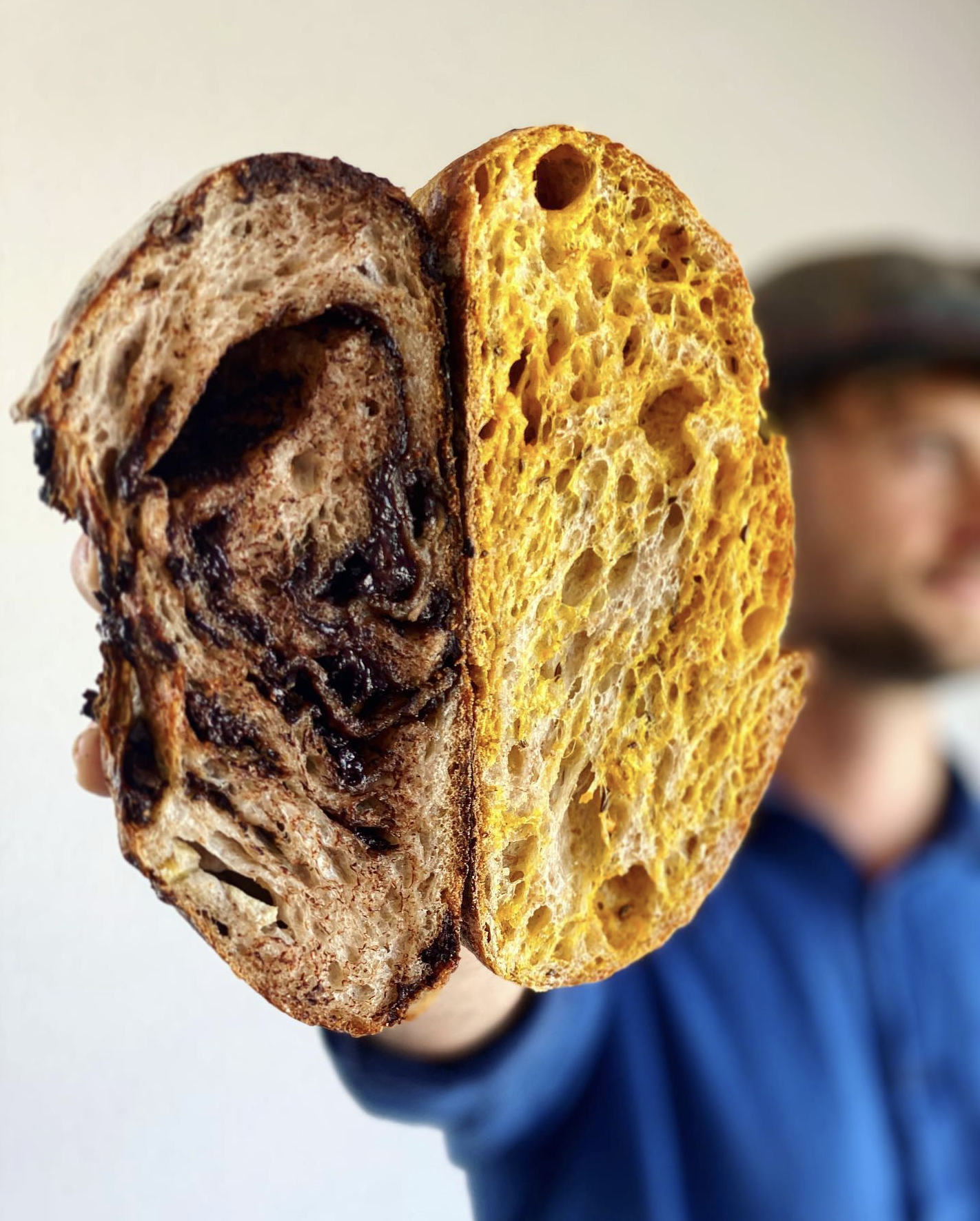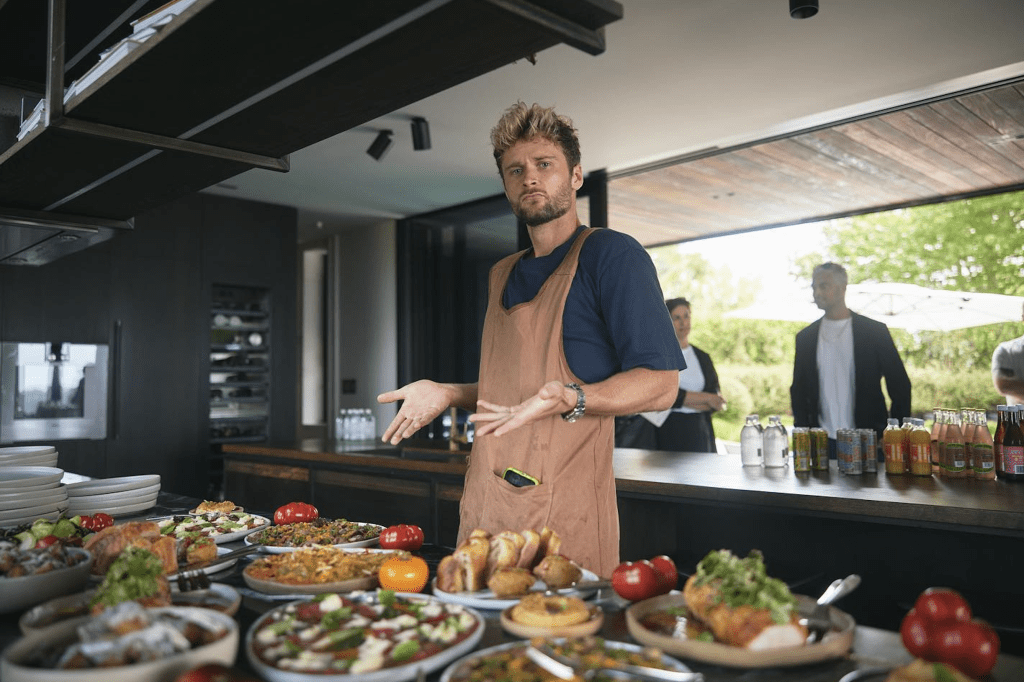Thank you for visiting The Sourdough People website and marketplace! We are thrilled to have you here and excited to share this detailed interview feature with you. In this interview, you’ll get to know Hercules Noble, a passionate sourdough baker who has journeyed from the United Kingdom to New Zealand, finding a unique blend of serenity and charm. He discovered his love for sourdough during the pandemic, experimenting with various ingredients and techniques. Hercules, a self-taught chef with no formal training, shares his insights on balancing tradition and innovation in sourdough baking. Don’t forget to follow Hercules on Instagram for more of his delightful creations and baking adventures!
Where are you from and what do you love about where you live?
I was born in the UK but moved to New Zealand when I was young because my dad was from there. What I love about New Zealand is the blend of serenity and charm that the country offers. Growing up in New Zealand since I was seven, I’ve come to appreciate its unique qualities, especially after experiencing the hustle and bustle of bigger cities like London and New York. New Zealand is a small country, and while it may not have the massive cities or the constant flurry of activities found elsewhere, that’s part of its charm. The smaller cities and towns have a humble, laid-back vibe. When you step off a plane in a place like London or New York, the pace of life hits you instantly. Everything moves so fast. In contrast, New Zealand offers a slower, more relaxed pace that feels refreshing. One of my favourite aspects of New Zealand is the ability to escape to places that are truly off the grid. We have a holiday home, or “bach,” in the far north, completely off the grid. It’s the perfect spot to unwind and escape the everyday grind of city life. Currently, I’m enjoying a beautiful stint in upstate New York, surrounded by stunning old farmland in the Catskills. Spending most of my time on the property, with occasional trips to the local shops, reminds me of the tranquil beauty of home. Despite all my travels and the excitement of different cities, New Zealand remains my sanctuary. It’s a place where life moves a bit slower, and that, to me, is truly special.
What initially sparked your interest in sourdough baking? And how did you begin your journey?
I’ll give you one guess—the most obvious answer. Yep, the pandemic! Like so many others, I started baking during the pandemic. Funnily enough, we were up at our bach, completely off-grid. We had no access to scales, so I began by making a sourdough starter and just messing around with it. We didn’t even have a proper oven, just a wood-fired one. No Dutch oven either! I spent a while just figuring things out. After the first lockdown, which lasted about six weeks, I finally went out and bought some scales. During lockdown, I had all this time to make flatbreads and such, but not proper sourdough bread. So, while everyone else was ready to move on, I was super excited to get the equipment I needed and dive into real sourdough baking. Once I got the hang of making a nice, standard country loaf—not too high or low hydration, nothing special—I started having fun with it. I experimented with different ingredients like dark chocolate and orange, olives and rosemary. That’s when I gained a bit of traction online, but the real passion came a while later. And that’s how my sourdough journey began, from pandemic boredom to a delicious hobby!
How did you become a chef?
Well, I’ve had no formal training. I left school not knowing what to do, so I briefly went to university for a design course. During the first semester break, I got a part-time job in a kitchen because I always enjoyed cooking as a hobby. I never thought it would become a profession! After just two weeks in the kitchen, I realized I loved it way more than my design course. I dropped out and went full-time in that kitchen, working there for another two years. Then, I did some work in London. After about three years, I was feeling pretty burned out from kitchen life. So, I took some time off and started doing a bit of work here and there for family friends. From there, I transitioned to private chef work. I’ve never learned in a classroom. For me, it was all hands-on experience. I found it tough learning from YouTube videos, especially with sourdough. I wished I had someone there to answer questions like, “do I really need to do the stretch and folds every 30 minutes, or can I sometimes skip it?” I need to work with someone directly—classrooms just aren’t my thing.
How has being based in New Zealand, or anywhere you’ve been, added to your sourdough journey?
When it comes to the culture, absolutely no impact whatsoever! But how has living in New Zealand helped my sourdough journey? Oh, that’s a fun story! During lockdown, I started putting fun ingredients in my sourdough and sharing my creations online. People started messaging me on Instagram, eager to try my chocolate orange sourdough. So, before restaurants reopened, I began baking about 10 loaves each morning—it’s all I could manage in about four hours—and delivering them around Auckland. It created a bit of hype and demand. People would say, “If you can get your hands on one of these, it’s pretty sweet because he’s only doing 10 a day!” When it comes to learning sourdough, it’s not as strict as baking a cake. Cakes need precise measurements down to the gram, but with sourdough, there’s more room for experimentation. I’ve always told people that you don’t need to follow the guidelines too strictly. You can still get a great loaf without being glued to your dough for hours on end. For example, during bulk fermentation, you don’t need to do the stretch and folds every 30 minutes. If you have plans, you can let it be. When I first started, I followed the rules to the letter, but with experience, I realized there’s a lot of leeway. I also emphasize the importance of an active starter. If my starter’s been in the fridge, I pull it out and let it sit for 8 hours, then feed it in the morning, at night, and again the next morning. I want it super active and strong for baking. So, being in New Zealand, especially during lockdown, allowed me to experiment, create a bit of buzz, and develop my own flexible approach to sourdough baking. It’s been quite the journey!
Do you have a signature sourdough recipe or technique that you’re particularly proud of? And can you share a little bit about it?
Not really! I don’t have a particular signature move like tossing dough up the wall or anything quirky. I stick to the same basic recipe, but when I bake for content—especially for Will it Sourdough—I like to push the boundaries. I load my loaves with as much of the featured ingredient as I can get away with. Sometimes I go too far and think, “Oops, that’s too much!” Then, I have to dial it back a bit and try again. I prefer a low hydration dough because it needs to be strong enough to handle all that extra moisture, especially when adding ingredients like cheese, which can mess with the dough structure. High hydration is fantastic for making a nice, simple loaf with an open, fluffy crumb, but when you’re adding lots of extra ingredients, it just doesn’t work as well. So, low hydration it is for me, to keep the dough sturdy and manageable. In essence, my technique is all about experimentation and finding that perfect balance, but nothing too secretive or outlandish!
What are your must-have tools or favourite equipment for sourdough baking? And why?
Man, you’ve gotta have the metal and plastic dough scrapers. I mean, come on, everyone will tell you the same thing! I’ve been working here for the last two weeks, and I went to Walmart to try and get both, but they only had a metal one. I’ve missed the plastic one so much. I’ve got scales, of course, but I also miss my bannetons. They have to be the slightly oval ones—not the long oval, just slightly oval. I feel like they create the nicest shape and look. You know, the bamboo-looking ones? Why do I have to dry them in my oven afterward? I have no idea, but it’s part of the ritual. I’ve never used a dough whisk. When you’re hydrating the flour, mixing with your hands is just easier, especially with large amounts. A dough whisk feels like a marketing gimmick to me—bakers being told they need one, but I just use a wooden spoon for small loaves, and it works perfectly fine. When it comes to baking a loaf, I prefer a large cast iron combo cooker. You know, the one with the dome lid and a single handle on the side? It’s so much easier to grab out of the oven and deal with. Regular Dutch ovens are decent, but I find the combo cooker much more user-friendly, especially with the heavy dough. I’ve often thought about how many loaves I could bake at once if I had more of these combo cookers! So, there you have it—my essential tools for sourdough baking, each with its quirks and charm!
How do you source your ingredients? And do you have specific preferences or tips regarding your flour, water, or salt?
When I’m making content—and 90% of the time, that’s what I’m doing with sourdough—I’m not going on a grand quest for the finest ingredients. I usually use a nice, simple, strong, high-grade bread flour that’s readily available at the supermarket. No need for anything super special when it’s all about making videos and sharing the love (with the neighbours)! But when I’m baking for myself or my family, especially up at the bach, that’s when I bring out the good stuff. I use a nice quality pizza flour, double zero, with a high protein content. I’ve always got a big stash of it up there, ready for action. While I’ve been here in the States, I’ve noticed Bob’s Red Mill Flour, which seems to have a higher protein content than what we get in New Zealand or the UK. It’s really good flour, and I’ve been quite impressed with it. So, for everyday content, it’s the trusty supermarket flour. But for personal enjoyment, I go for the high-quality, high-protein stuff. It’s all about balancing practicality and indulgence!
What do you enjoy most about baking sourdough?
I can tell you what I enjoy most! The thing that really tickles my fancy about sourdough is the whole DIY, self-taught aspect of it. I’ve learned everything from the internet, practising and experimenting on my own. I’m not claiming to be the ultimate sourdough guru, but I’ve gained a pretty good understanding of it all through trial and error. One of the most satisfying moments is shooting those “Will It Sourdough” videos. It’s a bit of a mad scramble sometimes, shooting three videos at once, but there’s a lot of joy in the process. You know pretty early on if the dough’s going to behave. By the time I’m folding it and getting it ready for the fridge, I usually have a good sense of whether it’s going to turn out amazing or flop. The best part? When I do something completely bonkers like making a spaghetti bolognese-inspired sourdough, and it actually comes out looking like a proper loaf! The thrill of pulling that lid off the Dutch oven and seeing a beautiful, crazy loaf never gets old. Cutting into it and seeing that it looks just as good inside is the cherry on top. Of course, there are times when it doesn’t turn out so great, and that’s a bummer. But it’s all part of the fun. People’s reactions online are hilarious, too. Some folks love it and can’t wait to see what I’ll try next, while others are horrified and tell me I’m committing sourdough sacrilege. But hey, I’m just experimenting and having fun. If a loaf turns out awful, it goes to the birds, not the bin! I’ve also figured out that a little controversy can be a good thing. It gets people talking and engaging, which is great for the algorithm and my exposure. So, while I’m not out to offend anyone, I do enjoy throwing in something unexpected to stir the pot a bit. In the end, it’s all about having fun, experimenting, and not taking it too seriously. Most people love it, and that’s what matters. So, I’ll keep pushing the boundaries and enjoying every crazy loaf I bake!
And how does it impact your daily life?
I love baking sourdough, but it does have its quirks that can be a bit of a pain. Sure, it only takes a couple of minutes to feed the starter, clean up the mess, and get on with the day. But then there are those moments when I’m out on a Friday night, having a good time, and suddenly I remember, “Oh no, I need to feed my starter when I get home, or I can’t make those pizza breads in two days!” It’s a bit like having a pet that you have to think about in advance. I know it sounds a little negative, but it’s part of the process. The joy of creating a beautiful loaf of sourdough from scratch is totally worth it, even if it means juggling a few extra responsibilities. It’s all about planning and commitment, and while it can be a bit tricky, the satisfaction of baking a perfect loaf makes it all worthwhile. So, despite the occasional inconvenience, I still find sourdough baking incredibly rewarding and fun!
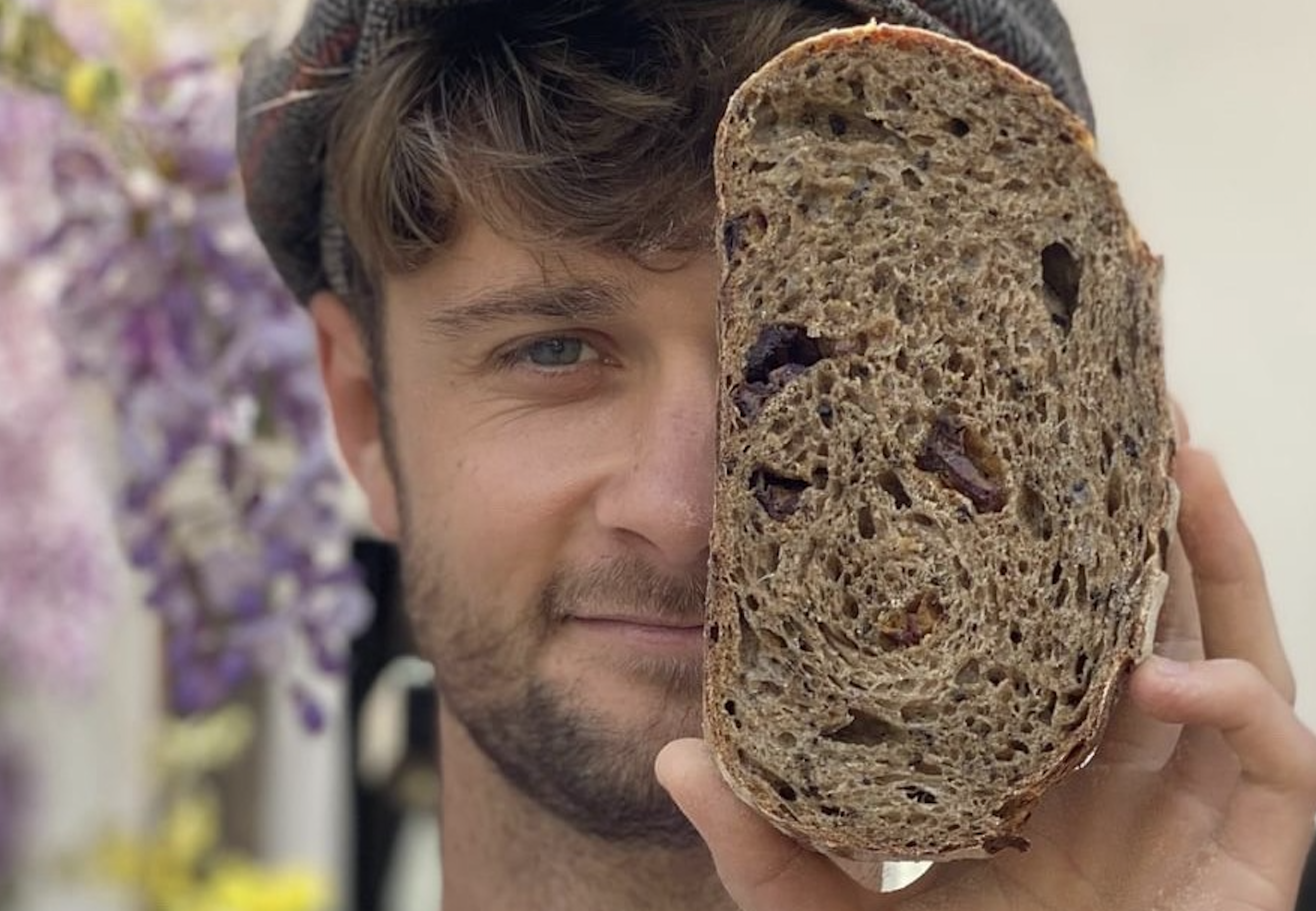
How do you balance tradition and innovation in your sourdough baking practices?
Well, here’s the scoop: while there are plenty of folks out there crafting top-notch, classic sourdough, my approach with “Will It Sourdough” is more like, “let’s shake things up a bit!” It’s not about claiming mastery or sticking to tradition—it’s about throwing spaghetti (literally, sometimes) at the wall and seeing what sticks. There are tons of talented bakers doing the traditional stuff justice, so I figure, why not have a little fun and try something wild? It keeps things exciting and who knows, sometimes it even works out deliciously!
What are some common misconceptions about sourdough baking that you’ve encountered, and how do you address them?
Oh, there are some hilarious myths about sourdough baking that I’ve come across! One of my favourites is the obsession with exact measurements down to the last gram. Like, come on, who needs 1,437 grams of water? It’s sourdough, not a precision rocket launch! You can swing it 20 or 30 grams either way, and your loaf will still turn out pretty awesome. And let’s talk about the misconception that you have to follow the recipe like it’s a legal document. Sure, baking is a bit of a science, but it’s also an art. It’s more about feel and intuition than rigid rules. You’re not in a lab coat; you’re in an apron, experimenting and having fun. Whether it’s summer or winter, the dough doesn’t care if you’re off for a kickabout or hanging out with friends. It’s forgiving enough for you to adapt and still get a great loaf. It’s like learning to draw—sure, you start with a ruler to get those straight lines, but eventually, you’re free handing it like a pro architect. So, next time you’re baking sourdough, remember: it’s all about experience and finding your groove. Don’t stress the grams, embrace the process, and enjoy the journey of creating something deliciously unique every time!
In your opinion, what is the most underrated aspect of sourdough baking?
Oh, here’s a fun one: sourdough is surprisingly kind to those who are somewhat tolerant to intolerant to wheat! I mean, it’s like a magic trick. You see firsthand how people can actually enjoy sourdough without the usual wheat woes. And then there’s the whole prebiotics and probiotics hype. Everyone’s all about fermented foods these days, right? But here’s the kicker: when you bake sourdough, it’s not like you’re nuking all those good guys. Sure, some might not survive the oven, but it’s still a whole lot better than your regular loaf. So, yeah, while I might not be the most health-conscious baker out there, it’s pretty cool knowing that sourdough can be a bit gentler on the gut and still pack some of those fermented food benefits. It’s like a tasty little bonus!
Are there any books, videos, or online resources that you’d recommend for people wanting to learn about baking sourdough?
YouTube, hands down! I’m a visual learner—I can’t just read a sourdough recipe, I need to see the magic happen. Joshua Weissman’s YouTube tutorial from 2020 was my go-to. It’s like sourdough school but without the tuition fees. And hey, don’t let your first flop get you down. Everyone’s got a few dough disasters under their belt. Remember, your failures are just flour and water—pretty cheap mistakes, right? A little salt, maybe, but it’s not like you’re breaking the bank. So, give it another shot. And another. Reach out to fellow bakers, ask questions, and keep experimenting. I wish I had done that more when I started. Just dive in, have fun, and let your sourdough adventures unfold!
How do you engage your followers and your sourdough community on social media? And what’s your style?
Oh, engaging with my sourdough crew is a blast! When there’s hate, I usually dodge it, but if I think of something funny, you bet I’ll respond. For genuine questions, I’m always there to help out. It’s all about keeping it light and fun while sharing the love for sourdough.
Have you participated in any collaborations or community events related to sourdough baking? And if so, what was your experience?
I haven’t really dived into many collaborations or community events yet, but it’s something I’m definitely open to. I’d love to team up with other bakers and see what kind of delicious chaos we can create together! However, I literally have two lined up next week! In New Zealand, there aren’t many creators doing similar things, but I’ve got some fun ones coming up. A friend of mine in London is teaming up with me. He makes sensational sandwiches. You know, those ASMR videos where he builds the most ridiculous sandwiches and then taste-tests them. I’m super excited about it! Collaborations are a blast and a great opportunity to mix things up and have fun.
Do you have any tips or suggestions on how to manage a healthy sourdough starter?
Stick to one type of flour—don’t go changing flours. Starters can be temperamental. If you know you won’t be baking in the next two weeks, pop that starter in the fridge. But here’s my routine: if it’s Monday and I want a loaf by Thursday, I take the starter out of the fridge tonight. Then, I feed it tomorrow morning and tomorrow night. By then, it’s active and ready to go! Think of your starter like a picky eater. The microbes in it love the flour they’re used to. Switch it up on them suddenly, and they’re like, “what the heck, dude?” It’s like trying to feed a baby orange juice instead of milk—major confusion and probably some mess. So, keep it consistent and your starter will thrive!
Do you think you will teach workshops in the future?
Yes, absolutely! I’ve done a few workshops before, and while it’s tricky to cram a 24-hour process into an hour or so, it’s always a blast. For instance, I’ve been working for the same folks at Sunshine Diner for the last two weeks. I told them, “Next time we do this, you should see how the sourdough is made!” After all, I’m baking it for you almost every other day. Imagine seeing it unfold in real-time instead of a fast-forwarded blur. It’s like trying to learn to dance by watching a speed-up video—much better when you can follow the steps in real-time! I’ve had a lot of people ask if I’d consider doing private dinner parties or sourdough workshops, and I’m definitely interested. So, stay tuned—maybe you’ll see me teaching a class near you soon!
What do you hope to contribute or be remembered for most in the sourdough community?
Oh, I’d love to be remembered as the guy who had a blast with sourdough. Just having fun, experimenting, and doing silly stuff—perfect! I’m not trying to claim that I make the best sourdough or that I know everything about it. I’m just having fun with it. It’s all about experimenting and enjoying the process. I mean, I look at people in fantastic bakeries around the world making amazing, high-quality sourdough, and sure, I admire them. But I don’t want to be in a kitchen as a baker every single day. Some people thrive on that, but I don’t. I get a kick out of seeing the dough rise, taking the lid off halfway through the bake, and going, “holy moly, it’s working!” Then, sharing it with my sister, brother, or friends and hearing them say, “wow, this is so good!”—that’s the fun part. That’s what I love. It’s all about enjoying the journey and the joy of sharing good bread with good people.
If you could give one piece of advice to your past self when you started sourdough, what would it be?
Reach out to people who know how to make sourdough! Seriously, don’t be shy—find someone local, maybe a baker, who you can chat with and ask questions. It’ll speed up the process and save you a ton of frustration. Remember, you won’t get everything right straight away. But that’s part of the fun! Most people with a smaller following are happy to help and share their wisdom because they’re passionate about it too. So, future me, don’t be afraid to connect with fellow sourdough enthusiasts. Your starter and your sanity will thank you!
Is there anything else that you would like the community to know about you? Or do you have anything that people can purchase or subscribe to?
Absolutely! You can find me on my website, plus I’m active on TikTok and Instagram, whipping up all sorts of sourdough shenanigans. And oh, the aprons you see me wearing? Those stylish beauties are handmade by my mom! I know, everyone keeps asking where they can get one. So, I’m working on sorting out some merch—hopefully dropping before Christmas. Imagine gifting or wearing one of these awesome aprons! Stay tuned, and let’s make our kitchens more fun and fabulous together!
Thank you for taking the time to read this interview on The Sourdough People website. We hope you enjoyed learning about Hercules and his unique approach to sourdough baking. From discovering his passion during the pandemic to experimenting with fun ingredients and techniques, Hercules embodies the joy and creativity of baking. Whether it’s sharing his favourite tools, tips for managing a starter, or his candid thoughts on tradition versus innovation, his journey is both inspiring and entertaining. Be sure to follow Hercules on Instagram and stay tuned for more exciting content and potential workshops in the future. Happy baking!
